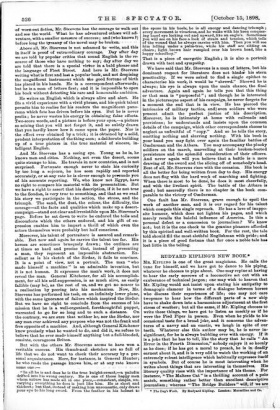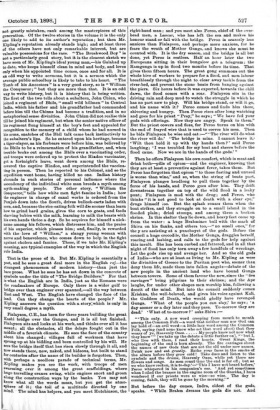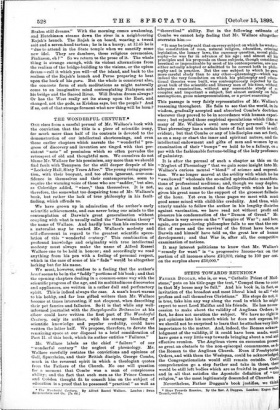RODYARD KIPLING'S NEW BOOK.*
Mn. KIPLING is one of the great magicians. He calls the tune for himself, and we have got to dance to his piping, whatever he chooses to pipe about. One may repine at having to hear the early sorrows of a locomotive set out with an exuberance of technical jargon ; one may wish to heaven that Mr. Kipling would not insist upon stating his antipathy to demagogic clamour in terms of a dialogue between horses who discuss their experiences of life; one may not care twopence to hear how the different parts of a new ship have to shake down into a harmonious adjustment at the first stress of weather; but all the same, if Mr. Kipling chooses to write these things, we have got to listen as meekly as if he were the Pied Piper in person. Even when he yields to his occasional taste for a broad joke, and it concerns the adven- tures of a navvy and an emetic, we laugh in spite of our teeth. Whatever else this author may be, be is never in- significant, for he is always babbling over with energy. If it is a joke that he has to tell, like the story that he calls "An Error in the Fourth Dimension," nobody enjoys it so keenly as he does; if he has got a moral to preach, he is in deadly earnest about it, and it is very odd to watch the working of an extremely robust intelligence which habitually expresses itself in symbols. But of course he is most interesting when he writes about things that are interesting in themselves. His literary quality rises with the importance of his theme. For instance, "The Maltese Oat" is a thrilling account of a polo match, something rather better than excellent descriptive journalism ; whereas "The Bridge Builders" will, if we are
• The Day's Work. By Itndyard Kipling. London: Macmillan and Co.
not greatly mistaken, rank among the masterpieces of this generation. Of the twelve stories in the volume it is the only one likely to add to its author's reputation; but then Mr. Kipling's reputation already stands high; and at least three of the others have not only remarkable interest, but are valuable possessions for the race. "The Brushwood Boy" is not a particularly good story, but it is the clearest sketch we have seen of Mr. Kipling's ideal young man,—his Galahad up to date, who keeps himself clean in mind and body, and loves only when his appointed time cornea, once and for all. It is an odd way to write sermons, but it is a sermon which the average public schoolboy is likely to take to his heart. "The Tomb of his Ancestors" is a very good story, so is "William the Conqueror ; " but they are more than that. It is an odd way to write history, but it is history that is being written. The first of the two tells about a subaltern, John Chinn, who joined a regiment of Bhils, "small wild hillmen " in Central India, which his father and his grandfather had commanded before him till the Chime had become a tradition, and in no metaphorical sense divinities. John Chinn did not realise this till he joined his regiment, but when the senior native officer of his regiment flung himself at the boy's feet and appealed for recognition to the memory of a child whom he had nursed in his arms, snatches of the Bhil talk came back instinctively to the subaltern's lips. So he entered upon his heritage, became a tiger-slayer, as his forbears were before him, was believed by the Bhils to be a reincarnation of his grandfather, and, when trouble broke out among the Bhils over a vaccinating order, and troops were ordered up to protect the Hiadoo vaccinator, got a fortnight's leave, went down among the Bhils, re- covered the captive Hindoo, and superintended the vaccina- ting in person. Then he reported to his Colonel, and so the expedition went home, having killed no one. Indian history abounds in such stories of personal influence where the ascendency of the individual white man breeds a myth among myth-making people. The other story, "William the Conqueror," tells how white men fight famine in India ; how the engineer in charge of canal works is ordered from the Punjab down into the South, drives bullock-carts laden with corn, and, because the rice-eating folk will die sooner than learn how to grind hard grains, gives the corn to goats, and feeds starving babies with the milk, learning to milk the beasts with his own hands thrice a day. So he acquires for himself a nick- name among his fellows, which distresses him, and the praise of his superior, which pleases him; and, finally, is rewarded with the love of "William," a slangy young woman with nerve and benevolence, who comes down to help in the fight against cholera and famine. These, if we take Mr. Kipling's meaning, are typical examples of the way in which the English rule India.
That is the prose of it. nut Mr. Kipling is essentially a poet, and he sees a great deal more in the English raj—the strangest phenomenon of modern history—than just the bare prose. What he sees he has set down in the concrete of symbols under the title of "The Bridge Builders." For that is what the English are in India, just as the Romans were the roadmakers of Europe. Only there is a wider gulf to bridge over than engineer ever spanned,—all the way between East and West. The English have changed the face of the land. Can they change the hearts of the people ? Mr. Kipling answers the question with a story;which is only in very small degree. a myth.
Finlayson, C.E., has been for three years building the great Kashi bridge over the Ganges, and it is all but finished. Finlayson sits and looks at his work, and thinks over all it has meant; all the obstacles, all the delays fought out in the middle of a feverish climate. He sees the face of the country about him changed ; villages full of workmen that have Sprung up at his bidding and been controlled by his will. He Bees the bridge itself that has risen slowly through it all, and now stands there, new, naked, and hideous, but built to stand for centuries after the name of its builder is forgotten. Then, With perhaps a needless parade of technical terms, Mr. Kipling makes you see the work, with troops of men swarming over it among the great scaffoldings, where huge travelling cranes swing, while engines snort and groan along the construction ways by the banks. You may not know what all the words mean, but you get the atmo- sphere of it ; the toil of a multitude directed by one mind. The mind has helpers, and you meet Hutchinson, the right-hand man; and you meet also Peroo, chief of the over-
head men, a Lascar, who has left the sea and makes his honour stand or fall with the bridge. Peroo is scarcely less anxious than Finlayson, and perhaps more anxious, for he fears the wrath of Mother Gunge, and knows she must be counted with. It is the dry season, and the bridge is all but done, yet Peroo is restless. Half an hour later the two Europeans sitting in their bungalow get a telegram ; the Ramgunga is up in flood two months before its time. That gives them fifteen hours. The great gong summons out the whole hive of workers to prepare for a flood, and men labour breathlessly through the night to clear away tackle from the river-bed, and prevent the stone boats from banging against the piers. Six hours before it was expected, towards the chill dawn, the flood comes with a roar. Finlayson sits in the driving rain and deep mud to watch the struggle in which he has no part now to play. Will his bridge stand, or will it go, and his name with it ? Peroo comes and finds him there, shivering and hungry. Then Peroo rises after long watching and goes for his priest "Pray," he says ; "We have fed your gods with offerings. Now they are angry. Speak to them." But the priest cowers and flees, for Peroo turns on him with the end of frayed wire that is used to coerce his men. Then
he bids Finlayson be wise and eat :—" The river will do what the river will do.' 'The bridge is mine. I cannot leave it.,
Wilt thou hold it up with thy hands then ' said Peroo laughing; I was troubled for my boat and sheers before the flood came. Now we are in the hands of the gods.'" Then he offers Finlayson his own comfort, which is meat and drink both—pills of opium—and the engineer, knowing that they are at least a preventive against fever, takes them. But Peroo has forgotten that opium "to those fasting and unused is worse than wine,' and so, when the string of boats part, Finlayson plunges headlong to pull them together by the force of his hands, and Peroo goes after him. They drift downstream together on top of the wild flood in a leaky punt; Finlayson is mad with the drug ; and Peroo, who thinks "it is not good to look at death with a clear eye," drugs himself 'coo. But the splash rouses them when the boat strikes, and they struggle on to a small island in the flooded plain; dried stumps, and among them a broken shrine. In this shelter they lie down, and heavy feet come up from the water : a huge Brahminee bull with the mark of Shiva on his flanks, and others too,—" no small ones," for the y are assisting at a puncha-yet of the gods. Before the council a huge crocodile, the Mother Gunga, draggles herself, roaring and lashing, and calls to the gods for help against this insult. She has been curbed and fettered, and in all that night of flood has only torn away a few handfuls of wreckage.
Let the gods rise up and avenge her. And so the old gods of India—who are at least as living to Mr. Kipling as were the divinities of Greece to the Puritan poet who, sooner than deny them life, made them into fallen angels—debate of the new people in the ancient land who have bound Gunga between towers. Some of them favour the new, since the "fire carriages" bring pilgrims to their shrines ; and the Ape laughs, for under other shapes men worship him, following a deceit of the mind. But into the council suddenly comes Krishna, the well-beloved, and gives his voice against Kali, the Goddess of Death, who would gladly have revenged Gunga. What of the people you can slay,' he says ; 'a day sooner or a day later and they pass. To-morrow they are dead.' 'What of to-morrow ?' asks Shiva :—
"This only. A new word creeping from month to month among the Common Folk—a word that neither man nor God, can lay hold, of—an evil word—a little lazy word among the Common Folk, saying (and none know who set that word afoot) that they weary of ye, Heavenly Ones My people know not now what they know ' " [we take up the debate a little further onl, "'but I, who live with them, I read their hearts. Great Kings, the beginning cf the end is born already. The fire carriages shout the names of new Gods that are not the old under new names. Drink now and eat greatly. Bathe your faces in the smoke of the altars before they grow cold Take dues and listen to the cymbals and the drums, Heavenly Ones, while yet there are flowers and songs. As men count time the end is far off ; but as we who know reckon, it is to-day.'--' This I have not heard before,' Pero* whispered in his companion's ear. Ind yet sometimes when roiled the brasses in the engine room of the Goorkha, I have wondered if our priests were so wise—so wise. The day is coming, Sahib, they will be gone by the morning."
But before the day comes, Indra, oldest of the gods, speaks. "While Brahm dreams the gods die not. And Brahm still dreams." With the morning comes awakening, and Hutchinson steams down the river in a neighbouring Rajah's launch. The Rajah is on board, wearing a tweed suit and a seven-hued turban ; he is in a hurry; at 12.45 he is 'due to attend in the State temple when we sanctify some new idol. They are dambore, these religious ceremonies, Finlinson, eh ? " So we return to the prose of it. The whole thing is strange enough, with its violent alternations from the realism of the bridge-building to the visions, or the opium dream—call it which you will—of the island, and back to the realism of the Rajah's launch and Peroo preparing to beat upon the back of his guru. But the whole is consistent also, the concrete form of such meditations as might naturally come to an imaginative mind contemplating Finlayson and his bridge and the Sacred River. Will Brahm dream always ? Or has the West really set its stamp upon the East, and changed, not the gods, as Krishna says, but the people ? And if so, out of that strange ferment what new thing will be born ?








































 Previous page
Previous page